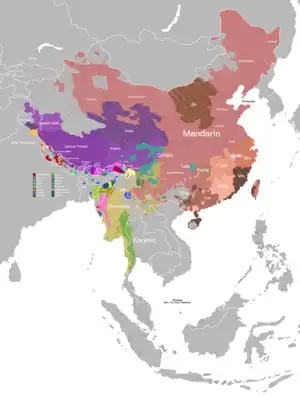| Sartang | |
|---|---|
| But(pa) | |
| Native to | India |
| Region | Arunachal Pradesh |
Native speakers | 1,000 (2005)[1] |
Possibly Tibeto-Burman
| |
| Language codes | |
| ISO 639-3 | onp |
| Glottolog | sart1249 |
Sartang is a small language of India. It is one of the Kho-Bwa languages,[2] closest to Sherdukpen (50–60% lexical similarity).[1] Varieties include Sartang of Jergaon and Sartang of Rahung (Blench 2015).[3]
Distribution
Sartang (Boot Monpa) is spoken in the villages of Khoitam, Rahung, Namku-thangka (Salari), and Boot (Jerigaon) Khoina, West Kameng District (Dondrup 2004:1).[4] There were 2,986 Sartang people as of 1996.
The Ethnologue lists Jerigaon, Sellary, Khoitam, Rahung, Darbu and Khoina villages in Nafra and Dirang circles, West Kameng district.
Varieties
According to Roger Blench (2015),[3] Sartang is a cover term referring to various languages spoken in 11 villages southeast of Dirang in Nafra and Dirang circles in West Kameng District. There are 4 varieties total, and only Sartang of Rahung and Sartang of Jergaon have been documented.
Lieberherr & Bodt (2017)[5] list the following varieties.
- Rahung: spoken in Rahung village and nearby hamlets. Approximately 600 speakers.
- Khoitam: spoken in two main villages and nearby hamlets. Approximately 500 speakers.
- Jerigaon: spoken in Jerigaon village. Approximately 400 speakers.
- Khoina: spoken in Khoina village and nearby hamlets. Approximately 500 speakers.
References
- 1 2 Sartang at Ethnologue (18th ed., 2015) (subscription required)
- ↑ Post, Mark W. and Roger Blench (2011). "Siangic: A new language phylum in North East India", 6th International Conference of the North East India Linguistics Society, Tezpur University, Assam, India, Jan 31 – Feb 2
- 1 2 Blench, Roger. 2015. The Mey languages and their classification. Presentation given at the University of Sydney.
- ↑ Dondrup, Rinchin. 2004. An introduction to the Boot Monpa language. Itanagar: Directorate of Research, Government of Arunachal Pradesh.
- ↑ Lieberherr, Ismael; Bodt, Timotheus Adrianus. 2017. Sub-grouping Kho-Bwa based on shared core vocabulary. In Himalayan Linguistics, 16(2).
